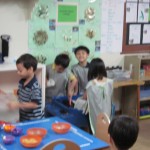 My Note: During my recent trip to the Philippines, I did a number of media interviews (television, print, and online). Here is an article that came out of one such interview. It appeared at www.InterAkyson.com, the online news portal of TV 5 in Quezon City, Philippines:
My Note: During my recent trip to the Philippines, I did a number of media interviews (television, print, and online). Here is an article that came out of one such interview. It appeared at www.InterAkyson.com, the online news portal of TV 5 in Quezon City, Philippines:
Educator warns: Be wary of schools preparing kids for ‘next level,’ focus on the ‘now’
By Minnie Francia for InterAksyon.com · Monday, September 17, 2012 · 6:30 am
Choosing the right school for their school child is every new parent’s concern. While most parents grew up within the “traditional school” setting with large class sizes and rigid curriculum, a lot of educators today believe that this may not be the best learning environment for children, especially for preschoolers.
The recent “Super Kids 2012” conference held at the SMX Convention Center, gathered educators, parents and others working in child development, in an interactive program to explore new ideas in education as well as how to best apply this in our local schools.
The main speaker of the two-day conference was Dr. Thomas Armstrong, award-winning author, educational consultant and lecturer. In his talk on “Exemplars of Best Schools”, Dr. Armstrong, who is a strong proponent of Howard Gardner’s Theory of Multiple Intelligences, suggested that parents should look beyond the “trad school” mold and look at schools that encourage the different smarts that their children were born with.
In general, when looking for a school for a child of any age, parents should see if the school respects the unique developmental needs of children. For kids aged 3-6, a good school should recognize developmental characteristics such as the need for play, the understanding of how a child’s brain is stimulated by the environment, and the child’s unique emotional reactions.
Be wary of schools that boast of preparing your child for the next school level. The key is to focus on their learning NOW and not just on preparing preschoolers for big school, and thus forcing them to do activities that are inappropriate for their age.
For the 3-6 age group, Dr. Armstrong lists some “inappropriate” school practices:
1. Formal literary and Math instruction. Worksheets and flashcards are not the best ways to teach kids how to read or learn math at this age. Instead, preschoolers should be encouraged to learn these concepts with hands-on experiences and interactions with others and materials in school.
2. Standardized testing. Making kids take tests to compare them with the supposed “norm” should not be done at this age.
3. High-tech learning. Computers and gadgets can wait till they are older. Preschoolers need to live, play, and learn in the real world and not in the virtual world.
4. Homework. Dr. Armstrong discourages making preschoolers answer worksheets or textbooks at home.
5. Long day in school with less naptime or recess. This can only mean a “stressed child”.
In contrast, Dr. Amstrong advocates the following BEST practices in a preschool curriculum:
1. Play-oriented. A preschooler should have plenty of time for free, unstructured play because playing is the most significant aspect of learning at this age.
2. Reggio Emilia Approach. This educational philosophy from Italy respects the individuality of children and encourages them to co-create their class curriculum together with their teachers, classmates and parents. In a Reggio Emilia classroom for instance, kids learning about dinosaurs may get the idea of building their own prehistoric animals while the teacher provides them with the necessary materials and instruction.
3. Waldorf Education. This approach, first created by Rudolf Steiner, works very well with children because of its emphasis on play and imagination.
4. Bank Street School Approach. This school method uses a child-centered education program that encourages kids to learn directly from experience and allows them to actively interact with their community.
5. Maria Montessori Education. This school philosophy emphasizes respect for the integrity of a child. A child fully-absorbed in play or an activity for instance, is considered by educator Maria Montessori as a kid “at work” and should be allowed to process learning during this precious time.
For Dr. Armstrong, all children are born geniuses with their own unique abilities to grow and learn. When choosing a school for your child then, try to look for one that aims to encourage and not suppress these gifts. After all is said, it is really that glow and sparkle in the eyes of your child that will help you determine if she is having fun while learning.
The Super Kids 2012 was organized by Primetrade Asia, Inc, Potencia, Inc. and Progress Preschool Gold.
For more information on Dr. Armstrong’s ideas about education, see his book If Einstein Ran the Schools: Revitalizing U.S. Education
This article was brought to you by Thomas Armstrong, Ph.D. and www.institute4learning.com.
Follow me on Twitter: @Dr_Armstrong



















